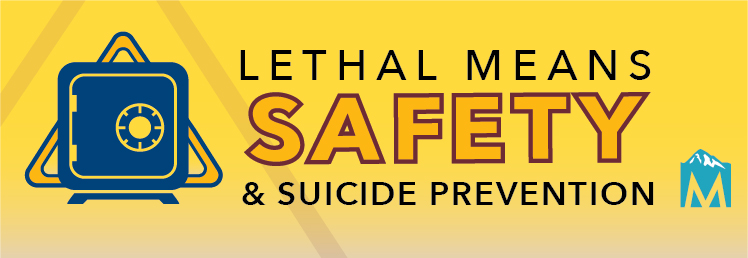options

What is an “evidence-based” LMS recommendation?
- Most of the evidence supporting LMS recommendations comes from studies comparing suicide risk between those with and without household access to a specific method.
- Thus, recommendations to remove access to a specific method have the strongest evidence.
- Recommendations to reduce (but not eliminate) access come second.Firearm-specific LMS
- How?
- Recommendation #1: Temporarily remove firearms from the home and adjacent area, including garages and vehicles.
- Have a trusted family member, friend, or fellow Veteran hold on to them.*
- Rent a personal storage unit.
- Contact a local shooting range, firearm club, or firearm retailer to inquire about storage options.
- Contact local law enforcement to inquire about storage options.
- Contact a local pawn shop to inquire about storage options.
- Sell or pawn the firearm.
- Remove ammunition from the household.
Recommendation #2: Increase the safety of firearms stored within the home.
- Lock them up.
- There are various options for locking up household firearms which you should know about. Firearm owners may have strong preferences for how their firearms are stored . Learn more here:
- Consider asking a trusted family member, friend, or fellow Veteran to temporarily change the number combination or hold on to the key.
- Store them unloaded.
- Lock up the ammunition.
- Disassemble the firearm. Considering locking up or storing specific parts elsewhere (e.g., firing pin, slide).
Special considerations in firearm-specific LMSC:
- There is a sociocultural value to owning and using firearms . Recognizing the importance and value of firearms in some Veterans’ lives is important for initiating these discussions.
- Two-thirds of Veterans own firearms for personal or household protection . In many cases, effective LMSC may include a discussion about balancing the short-term risk of self-injury against the long-term risk of victimization from others.
Medication-specific LMS
- Is the medication potentially toxic if taken in large quantities?
- No – no LMSC required.
- Yes – continue.
- Unsure – consult the team pharmacist.
- Is the medication essential? Examples of essential medications include daily pills for blood pressure, mental health, or diabetes. Examples of potentially non-essential medications include acetaminophen or ibuprofen for rare headaches.
- No.
- Recommendation #1: Consider removing the medication from the home.
- Dispose of them using:
- Disposal bins in VHA facilities.
- Disposal bins in local pharmacies.
- The VHA MedSAFE program provides free, federally-approved medication disposal envelopes for patients. Learn more here :
- Medication disposal/destruction kits
- ^Store them with a trusted family member, friend or fellow Veteran.
- Dispose of them using:
- Recommendation #2: Increase the safety of medications stored within the home.
- Recommendation #1: Consider removing the medication from the home.
- Yes.
- Increase the safety of medications stored within the home.
- Consider reaching out to your patient’s prescribing provider or pharmacist to ask whether it is possible to limit the prescribed and dispensed quantities of specific medications, or if alternative, equivalent treatments are available.
- Consider reaching out to your patient’s pharmacist to ask whether blister packaging of medications is available.
- Increase the safety of medications stored within the home.
- No.
Special considerations in medication-specific LMSC:
- A recent study found that access to the opioid medications (e.g., oxycodone, morphine) of family members is an important risk factor for suicide. When possible, household members should increase the safe storage of their own potentially-lethal medications .
- Opioids are a common cause of medication-related suicide and self-injury among U.S. Veterans. Naloxone (either nasal spray or auto-injector) is a reversal medication that is effective in preventing opioid overdose. Consider providing naloxone to patients who use prescribed (e.g., morphine) or unprescribed (e.g., morphine, heroin) opioids and teach them and their family members how to use it in case of an overdose.
- Trainings available here :
When recommending that a Veteran transfer his or her firearm to another individual, it is important to remember two issues:
- Firearms should not be transferred to other individuals who themselves are at risk of suicide or unintentional injury, or reside in households with those at risk of injury.
When recommending that a Veteran transfer his or her potentially-toxic medications to another individual, it is important to remember that they should not be transferred to other individuals who themselves are at risk of suicide or unintentional injury, or reside in households with those at risk of injury.
| Sitemap | |||
| LMS Home | Facts | Safety | |
| Counseling | Action | Resources | |
| RM MIRECC | MIRECC Website | ||



















